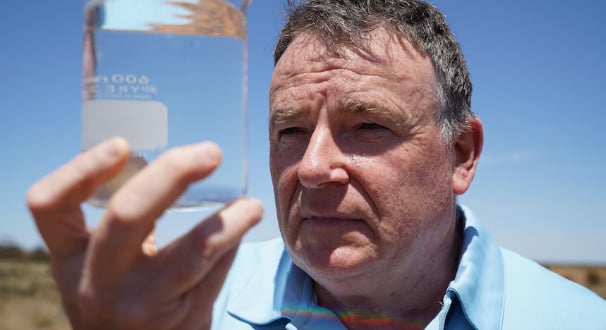May 16, 2025 | 10:39 GMT +7
May 16, 2025 | 10:39 GMT +7
Hotline: 0913.378.918
May 16, 2025 | 10:39 GMT +7
Hotline: 0913.378.918

John Carragher examines saline groundwater extracted from a site in Waikerie.
An Adelaide-based aquaculture company wants to develop an inland fish farm hundreds of kilometres from the sea, using reserves of saline groundwater pumped deep from under the earth.
A-Culture has purchased a 50-hectare site near the Riverland town of Waikerie, in South Australia, where it plans to grow yellowtail kingfish.
It is not the first time the company has tried to launch a project reliant on the state's stocks of salty water, which have long been a threat to the health of the River Murray.
A-Culture aquaculture scientist John Carragher said Waikerie was the ideal location for the project because of its potential to grow a sustainable supply of marine fish all year round.
"The water is half-strength sea water and … a good intermediate temperature for growing local species like yellowtail kingfish," Dr Carragher said.
The scientist said the saline groundwater had a consistent temperature of around 20 degrees Celsius.
Dr Carragher said he hoped the site could one day host up to 20 individual farms — each capable of producing 240 tonnes of fish annually.
In addition to growing marine fish, a small-scale trial will also take place on the site to investigate how to use waste from the farm to grow asparagopsis seaweed.
The seaweed has been a focus of studies around Australia, investigating whether its use as a livestock feed supplement can help reduce greenhouse gas emissions.
"Our wastewater from the fish farm will go through seaweed aquaculture, and we'll be growing high-value seaweeds for either the food industry or to feed to cows to reduce the amount of methane they produce as they're grazing," Dr Carragher said.
Research conducted in Waikerie by the South Australian Research and Development Institute (SARDI) between 2004 and 2008 proved the aquaculture model was technically viable for the Australian market, and demonstrated marine fish were capable of surviving and growing in the groundwater.
According to a report released by the Fisheries Research and Development Corporation (FRDC) in 2023, research into inland saline aquaculture has "considerable support" from federal and state governments, including in South Australia.
But the report claimed commercial development had not proceeded "as expected" in Australia, mainly due to the "failure to secure long-term water security" of sufficient quantity.
Dr Carragher acknowledged a key challenge for the project was securing funding due to "bad publicity" from failed aquaculture projects elsewhere.
But former SARDI scientist and current FRDC research manager, Wayne Hutchinson, said most of the challenges with inland fish farms and water supply had been solved.
"It's just a question of where the markets are, what scale it needs to operate at.
"To make these things work now you need a scale of operation approaching thousands of tonnes."
(ABCNews)

(VAN) Fourth most important food crop in peril as Latin America and Caribbean suffer from slow-onset climate disaster.

(VAN) Shifting market dynamics and the noise around new legislation has propelled Trouw Nutrition’s research around early life nutrition in poultry. Today, it continues to be a key area of research.

(VAN) India is concerned about its food security and the livelihoods of its farmers if more US food imports are allowed.

(VAN) FAO's Director-General emphasises the need to work together to transform agrifood systems.

(VAN) Europe is facing its worst outbreak of foot-and-mouth since the start of the century.

(VAN) The central authorities, in early April, released a 10-year plan for rural vitalization.

(VAN) Viterra marked a significant milestone in its carbon measurement program in Argentina, called Ígaris, reaching 1 million soybean hectares measured.